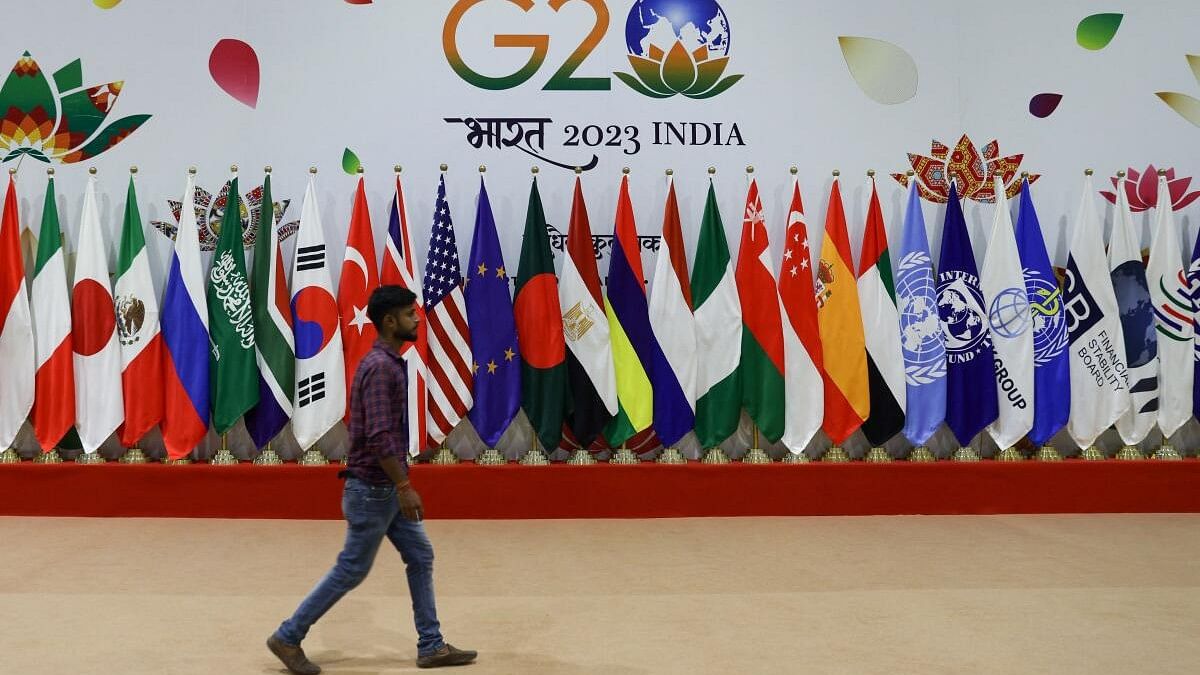
File photo of flags of various nations amid G20 Summit in New Delhi.
Credit: PTI Photo
New Delhi: Induction of 55-nation African Union as a permanent member of the G20, steps to address climate change and managing to produce a leaders' declaration overcoming deep divisions over the Ukraine conflict were seen as major achievements of India's presidency of grouping of the world's 20 big economies.
As the year-long presidency comes to an end, foreign policy experts said the one-year period saw India boosting its global standing and cementing its position as a credible voice of the Global South.
India officially took charge as the G20 president on December 1 last year and Brazil is set to assume the prestigious position on Friday.
'India cemented its position as a prominent voice of the Global South besides enhancing its overall global standing,' said former diplomat Ashok Sajjanhar.
In a significant milestone under India's G20 presidency, the African Union in September became the new permanent member of the grouping of the largest economies of the world in the first expansion of the influential bloc since its inception in 1999.
India was consistently batting for inclusion of the African Union as a G20 member so as to ensure representation of the African continent in the top global body.
The African Union (AU) is an influential organisation comprising 55 member states that make up the countries of the African continent.
As the G20 president, India focused on issues like inclusive growth, digital innovation, climate financing and equitable global health access with an aim to benefit the Global South or the developing countries.
In an opinion piece that appeared in several newspapers on Thursday, Prime Minister Narendra Modi said India's approach was defined by being 'inclusive, ambitious, action-oriented, and decisive' and the New Delhi Leaders' Declaration (NDLD), unanimously adopted by all G20 members, is testimony to our commitment to deliver on these principles.
'Assuming the G20 chair, India sought to offer the world an alternative to the status quo, a shift from a GDP-centric to human-centric progress. India aimed to remind the world of what unites us, rather than what divides us,' he said.
India's G20 presidency marked a significant milestone in its global leadership, said Sajjanhar.
Another expert said the G20 Leaders' declaration at the summit notwithstanding deep divisions on the Russia-Ukraine conflict was a shining example of India's leadership.
Under India's presidency, the G20 agreed to aim at tripling renewable energy capacity globally by 2030 which was seen as a major takeaway.
India has made G20 far more inclusive by ensuring inclusion of the African Union as a permanent member of the grouping under its presidency, New Delhi's G20 Sherpa Amitabh Kant said earlier this month.
'One of the lasting images that will carry on forever in my mind of India's G20 presidency is the image of the prime minister hugging the president of Comoros and welcoming the African Union as a permanent member of the G20,' Kant said.
'With that one stroke, India ensured that the G20 became a far more inclusive institution,' he said.
India also hosted a G20 virtual summit on November 22 that deliberated on taking forward key outcomes and action points firmed up at the annual summit.
The G20 member countries represent around 85 percent of the global GDP, over 75 per cent of the global trade, and about two-thirds of the world population.
The grouping comprises Argentina, Australia, Brazil, Canada, China, France, Germany, India, Indonesia, Italy, Japan, the Republic of Korea, Mexico, Russia, Saudi Arabia, South Africa, Turkey, the UK, the US, the European Union (EU) and the African Union.